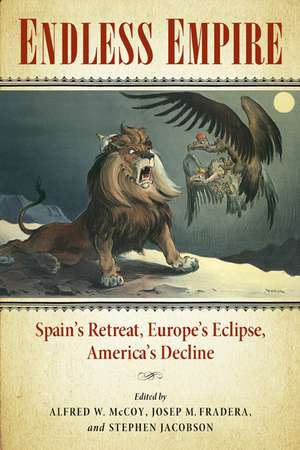Endless Empire: Spain's Retreat, Europe's Eclipse, America's Decline
Editat de Alfred W. McCoy, Josep M. Fradera, Stephen Jacobsonen Limba Engleză Paperback – 26 oct 2012
Throughout four millennia of recorded history there has been no end to empire, but instead an endless succession of empires. After five centuries of sustained expansion, the half-dozen European powers that ruled half of humanity collapsed with stunning speed after World War II, creating a hundred emerging nations in Asia and Africa. Amid this imperial transition, the United States became the new global hegemon, dominating this world order with an array of power that closely resembled that of its European predecessors.
As Brazil, Russia, India, China, and the European Union now rise in global influence, twenty leading historians from four continents take a timely look backward and forward to discover patterns of eclipse in past empires that are already shaping a decline in U.S. global power, including:
• erosion of economic and fiscal strength needed for military power on a global scale
• misuse of military power through micro-military misadventures
• breakdown of alliances among major powers
• weakened controls over the subordinate elites critical for any empire’s exercise of global power
• insufficient technological innovation to sustain global force projection.
As Brazil, Russia, India, China, and the European Union now rise in global influence, twenty leading historians from four continents take a timely look backward and forward to discover patterns of eclipse in past empires that are already shaping a decline in U.S. global power, including:
• erosion of economic and fiscal strength needed for military power on a global scale
• misuse of military power through micro-military misadventures
• breakdown of alliances among major powers
• weakened controls over the subordinate elites critical for any empire’s exercise of global power
• insufficient technological innovation to sustain global force projection.
Preț: 251.80 lei
Nou
Puncte Express: 378
Preț estimativ în valută:
48.18€ • 50.41$ • 40.02£
48.18€ • 50.41$ • 40.02£
Carte tipărită la comandă
Livrare economică 02-16 aprilie
Preluare comenzi: 021 569.72.76
Specificații
ISBN-13: 9780299290245
ISBN-10: 0299290247
Pagini: 492
Ilustrații: 29 b-w illus.
Dimensiuni: 152 x 229 x 38 mm
Greutate: 0.73 kg
Ediția:1
Editura: University of Wisconsin Press
Colecția University of Wisconsin Press
ISBN-10: 0299290247
Pagini: 492
Ilustrații: 29 b-w illus.
Dimensiuni: 152 x 229 x 38 mm
Greutate: 0.73 kg
Ediția:1
Editura: University of Wisconsin Press
Colecția University of Wisconsin Press
Recenzii
“A rich combination of historical expertise, comparative perspective, and engagement with contemporary trends at the outset of the twenty-first century. It should be a foundational text and point of reference for teaching and scholarship on imperial histories and on American power in today’s world.”—John Sidel, London School of Economics
“An exceptionally comprehensive look at empire in a genuinely global context. The scope and sophistication of these essays are unequaled anywhere.”—Franklin W. Knight, Johns Hopkins University
“Without doubt an important contribution to world diplomacy and a credit to the University of Wisconsin Press for publishing it.”—Red Wing Republican Eagle
“A rich, globally vast portrait of imperial decline that should interest scholars engaged in any aspect of history touched by empire’s receding, relentlessly grasping tendrils.”—H-Net Reviews
Notă biografică
Alfred W. McCoy is the J.R.W. Smail Professor of History at the University of Wisconsin–Madison and author of Policing America’s Empire. Josep M. Fradera is professor of history at the Universitat Pompeu Fabra in Barcelona, Spain, and author of many books on Spanish colonial history, including Colonias para después de un imperio. Stephen Jacobson is associate professor of history at Pompeu Fabra and author of Catalonia’s Advocates.
Cuprins
Illustrations
Acknowledgments
Part 1: Introduction
Fatal Florescence: Europe's Decolonization and America's Decline
Alfred W. McCoy
Part 2: Spain's Long Imperial Retreat
Eclipse and Collapse of the Spanish Empire, 1650–1898
Josep M. Delgado Ribas
Empires in Retreat: Spain and Portugal after the Napoleonic Wars
Josep M. Fradera
Imperial Ambitions in an Era of Decline: Micromilitarism and the Eclipse of the Spanish Empire, 1858–1923
Stephen Jacobson
"The Empire Is No Longer a Social Unit": Declining Imperial Expectations and Transatlantic Crises in Metropolitan Spain, 1859–1909
Albert Garcia Balañà
Part 3: Imperial Transitions in Latin America and Philippines
Facing South: The Liberal Traditions in the Americas
Greg Grandin
"Alliance Imperialism" and Ango-American Power after 1898: The Origins of Open-Door Internationalism
Courtney Johnson
Pro-Imperialist Nationalists in Spain's Caribbean Empire
Francisco A. Scarano
Imperial Transition in the Philippines: The Making of a Colonial Discourse about Spanish Rule
María-Dolores Elizalde
The Broken Image: The Spanish Empire in the United States after 1898
Christopher Schmidt-Nowara
Part 4: British Global Dominion and Decline
Information and Intelligence in the Mid-Nineteenth Century Crisis in the British Empire
Tony Ballantyne
The Fin-de-siècles of Great Britain and the United States: Comparing Two Declining Phases of Global Capitalist Hegemony
Kelvin Santiago-Valles
The Geopolitics of Decolonization
John Darwin
Part 5: Complexities and Contradictions of French Decolonization
The Absent Empire: The Colonies in French Constitutions
Emmanuelle Saada
When Did Decolonization End? France and the Ending of Empire
Robert Aldrich
Decolonizing France: L.S. Senghor's Redemptive Program for African Socialism
Gary Wilder
Part 6: Subordinate Elites and Imperial Decline in Southeast Asia
Informal Empire: The Case of Siam and the Middle East
Gregory A. Barton
Scientific Patriotism: Medical Science and National Self-Fashioning in Southeast Asia
Warwick Anderson and Hans Pols
Decolonization and the Roots of Democracy
Remco Raben
Part 7: Imperial Decline and National Identities
Natives Who Were Citizens and Natives Who Were Indígenas in the Portuguese Empire, 1900–1926
Cristina Nogueira da Silva
From Subjecthood to Citizenship in South Asia: Migration, Nationality, and the Post-Imperial Global Order
Joya Chatterji
Part 8: U.S. Global Hegemony
The "Three R's" and the Making of a New World Order: Reparation, Reconstruction, Relief, and U.S. Policy, 1945–1952
Greg Bankoff
Entangled Empires: The United States and European Imperial Formations in the Mid-twentieth Century
Julian Go
Cold War Transition: Europe's Decolonization and Eisenhower's System of Subordinate Elites
Brett Reilly
Imperial Illusions: Information Infrastructure and the Future of U.S. Global Power
Alfred McCoy
Contributors
Index
Descriere
Throughout four millennia of recorded history there has been no end to empire, but instead an endless succession of empires. After five centuries of sustained expansion, the half-dozen European powers that ruled half of humanity collapsed with stunning speed after World War II, creating a hundred emerging nations in Asia and Africa. Amid this imperial transition, the United States became the new global hegemon, dominating this world order with an array of power that closely resembled that of its European predecessors.
As Brazil, Russia, India, China, and the European Union now rise in global influence, twenty leading historians from four continents take a timely look backward and forward to discover patterns of eclipse in past empires that are already shaping a decline in U.S. global power, including:
• erosion of economic and fiscal strength needed for military power on a global scale
• misuse of military power through micro-military misadventures
• breakdown of alliances among major powers
• weakened controls over the subordinate elites critical for any empire’s exercise of global power
• insufficient technological innovation to sustain global force projection.
As Brazil, Russia, India, China, and the European Union now rise in global influence, twenty leading historians from four continents take a timely look backward and forward to discover patterns of eclipse in past empires that are already shaping a decline in U.S. global power, including:
• erosion of economic and fiscal strength needed for military power on a global scale
• misuse of military power through micro-military misadventures
• breakdown of alliances among major powers
• weakened controls over the subordinate elites critical for any empire’s exercise of global power
• insufficient technological innovation to sustain global force projection.















